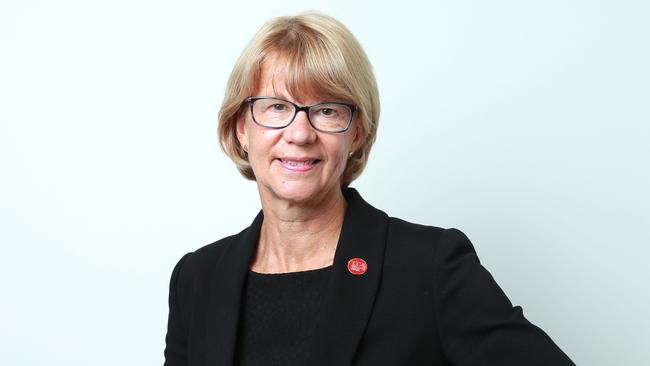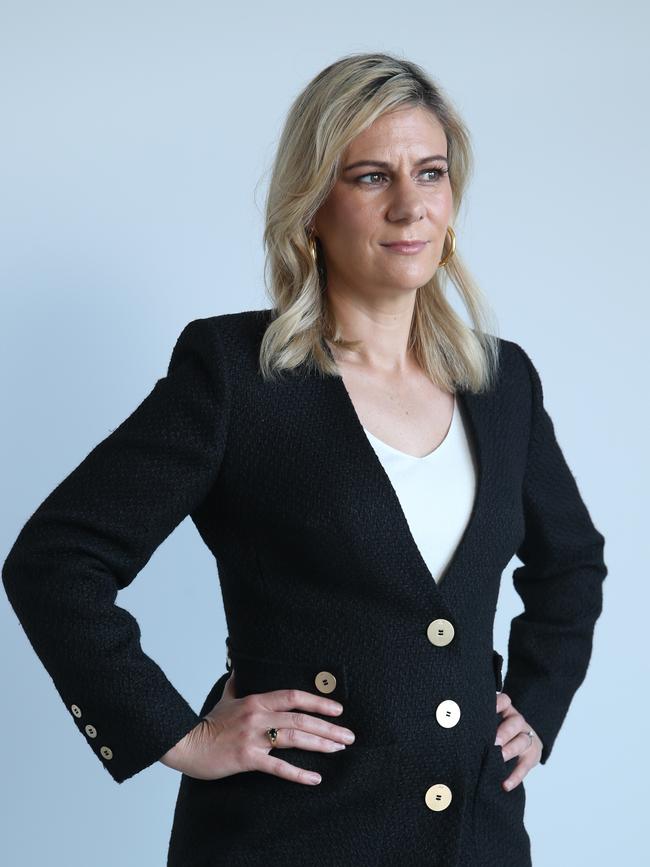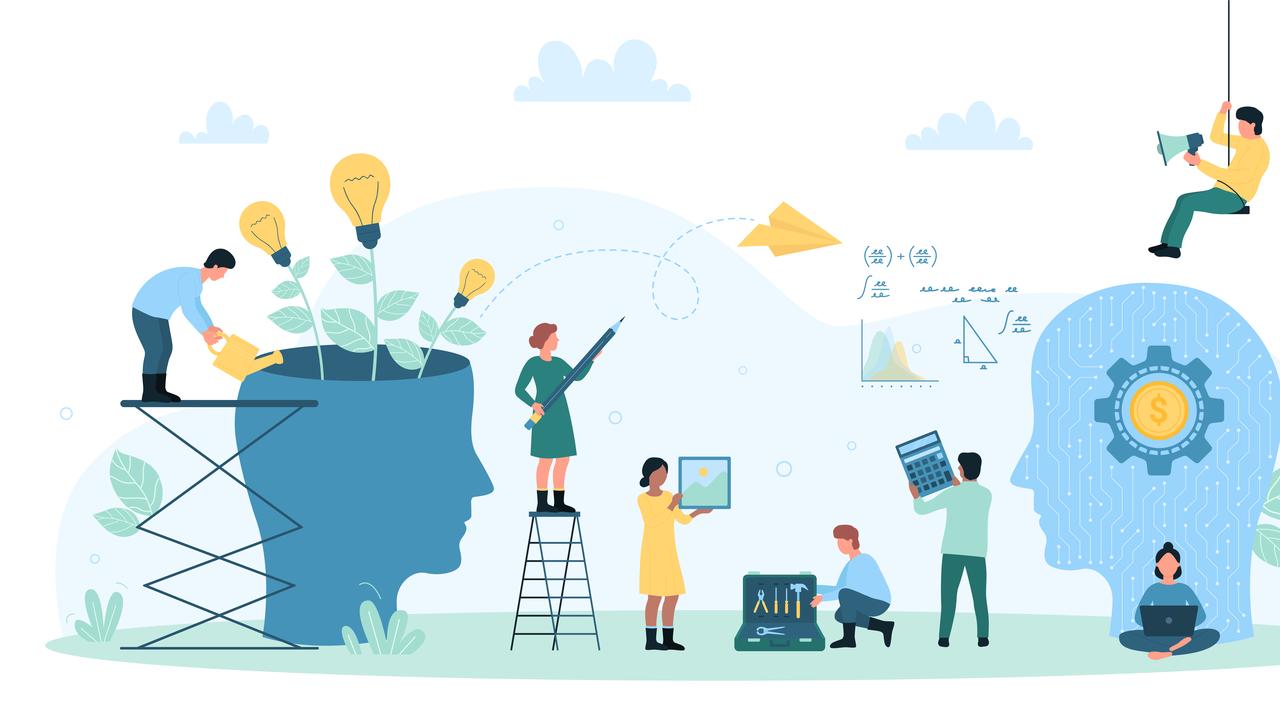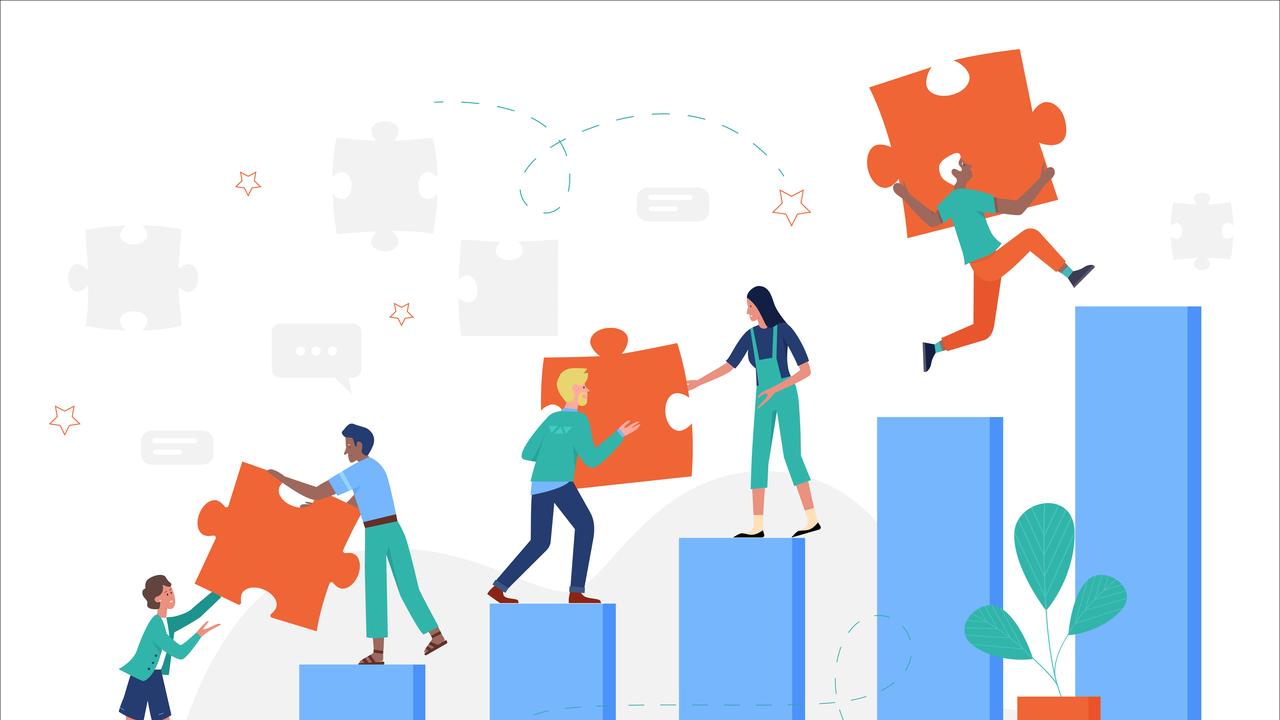Alison Watkins: how Coca-Cola Amatil is recalibrating success during Covid
Alison Watkins, group managing director of Coca-Cola Amatil was interviewed by Erica Berchtold chief executive of online retailer The Iconic.

They are role models for women in corporate Australia, but these leaders are also keen to learn from their peers. The Deal paired eight high-profile executives, founders and directors and asked them to probe the secrets of success. They took it from there.
ERICA BERCHTOLD: What was your early childhood education like, and what did you want to be when you grew up?
ALISON WATKINS: I grew up on a farm and I was the eldest of four, and I spent a lot of time with my dad, and he always wanted to teach me and really respond to my interest in the farm. But he was really interested in politics and the economy. He was always great at talking about those in ways that really brought it to life for me and just got me thinking about the broader environment. I had a real interest and curiosity in business and politics and the economy because of that. I went to boarding school in Hobart and then I went to the University of Tasmania. I went to an all-girls school and did pretty well at school, but I really wanted to go to agricultural college and learn more about farming, and live on a farm in Tasmania and probably marry a tall, dark and handsome farmer. I just loved that life so much. So things did really go off track for me when … I met Rod, my husband, at university and he was headed to Sydney, and so that definitely derailed my “marry a farmer and live in Tasmania” ambition.
EB: I also am the eldest of four kids. I was 15 months old when one of my sisters was born, so I think my leadership journey started then. As the eldest child you’re normally responsible for shoe-horning the rest of them into line.
AW: I really loved the opportunity to take on leadership roles at school and at university. I always had lots of supporters who encouraged me. I was the head prefect at school and college president, and all of those things I just really enjoyed.

EB: What advice do you have for your younger self?
AW: I think the main thing I would’ve appreciated back then is that your mindset is everything; to really appreciate that you can choose a state of mind. I remember, back then, as a Tasmanian, you have a bit of a chip on your shoulder and you feel you will be inferior to anyone else on the mainland, as we used to call it. I didn’t have a lot of belief in myself or really even an appetite to have a go at things and to be prepared to fail. I really wanted to play a pretty safe game. The consequence of that mindset is that you don’t set your sights particularly high or you don’t have a preparedness to try different things or have a go. I think I made a lot of assumptions about what I’d like and what I’d be good at, and they were very much based on what I knew. I knew I liked agriculture and farming and I knew I liked Tasmania. I’d (only) left Tasmania twice by the time I was 18. It didn’t really cross my mind that maybe there’s more to it than that.
EB: I think I had the same sort of mentality. I worked for Harvey Norman early in my career and I remember Gerry (Harvey) saying to me one day, “If you’re not making some mistakes then you’re not doing a good enough job for us, because it means you’re not actually pushing the envelope out there, trying new things”. I was astounded by that mentality.
AW: I’d definitely say, “have a go”. Think about how you’re creating options for yourself by trying new things, learning new skills and extending yourself, rather than just playing to your strengths and not testing yourself out and finding new strengths that you didn’t know about, or new areas of passion. I think another one is working with great people who you can learn from. Look around and think about the people you’re spending most of your time with. Are they people you admire and you can learn from? I think it’s really important, particularly early in your career, to be working with great people. And if you’re not working with people who you can learn from and admire, then you limit your growth.
EB: Is there some advice, professional or personal, that you wish women would ignore?
AW: I think the main advice women get, or perhaps think they’re getting, is that the organisation will help you with your career plan, create opportunities for you. It’s really important not to think there’s some sort of big machine that will create solutions and opportunities for you, but to recognise that it’s really people. People help people, and it’s people within the organisation you build relationships with, you build trust, you build their confidence. You need to have the mindset of creating those opportunities with the help and support of those people who want to help you. If you wait for the big machine, the HR team, to tell you what’s going to happen next, that is disempowering and disappointing most of the time.
EB: What are the benefits of good gender representation in organisations? We all talk about it a lot but I’d love to hear your articulation of that.
AW: I think there are two things. First of all, I think we make better decisions for it and, secondly, I think we have a healthy, sustainable culture. We want to be very customer focused, consumer focused, in our decision making, and it just really helps to have the breadth of perspective in the room when we’re making a decision, when we’re considering other stakeholders, when we’re considering, for example sustainability issues. There’s no doubt that we make better decisions for having a good gender balance. The other thing I’d say is the culture. We have a really great bunch of very balanced but very passionate people here at Amatil and it feels like a great bunch of people to be with. It’s a really constructive, positive environment and I very much believe that the gender balance is a big part of that.
EB: You’ve shown that it’s possible to juggle motherhood with a career; you’ve raised four children. How important is it for women to see you can have powerful roles and raise a family?
AW: It’s very important. There’s sometimes an attitude that women can have it all but just not at the same time. I would always advise younger women that keeping a balance in your life is so important. Ideally, it’s a balance every day or at least every week, or even maybe it’s in a month – a balance between yourself and your own health. It’s a balance with family and relationships. It’s a balance with work and a balance with the community. I always think about those four quadrants. And really thinking about what your goals are in each of those areas. Jobs come and go and you have tough periods; work can create a lot of stress. Bad things can happen to good people. Your family is always there for you and is always a great anchor and a purpose that keeps you centred and makes those other things recede into their proper place, instead of becoming overwhelming. Not everybody wants to or has the opportunity to have a family, but having other things in your life, apart from work, is important.
EB: I have three young children — I’ve got a five-year-old, a three-year-old and a one-year-old — and sometimes people say to me, “Wow. How do you make that work” or “What were you thinking?”. And some days, I do think, “What was I thinking?”. But more than anything, I just give advice to women, like “just don’t overthink it”. In 10 years’ time I’m not going to be sitting back thinking, “Gee, yesterday was a rough day”. I’ll be thinking, “Wow, look at my three lovely children”.
‘I have three young children — I’ve got a five-year-old, a three-year-old and a one-year-old. And sometimes people say to me, ‘Wow. How do you make that work?’ or ‘What were you thinking?’ And some days, I do think, ‘What was I thinking?’
— Erica Berchtold
EB: You spoke about the men who have championed you throughout your career, in and out of the boardroom, including your own husband. How important is it to have men as champions of women?
AW: It’s very important, particularly when you want to make change happen fast … because men still are in a lot of the positions of power in our large organisations. And therefore, if men in those influential roles want to make change happen and can be change agents, the amount of change, the speed of change is dramatic. We’ve seen some outstanding male role models – people who are confident and don’t worry about what other people are going to think. They just do what they think is the right thing and create opportunities for people who they know will be successful. There are a lot of people who aren’t intentionally biased but unconsciously still display those behaviours. If you’ve got enlightened men in influential roles, their ability to shine the light on unconscious bias is really important, as well as their ability to make change happen by creating opportunities for talented women.
EB: You’ve discussed how you found it difficult throughout your career to blow your own trumpet. Have you overcome that reluctance to show what you’re capable of, to dial that up?
AW: The thing I realised was that if you really want to make a difference to an organisation, you need to persuade people to do things differently. At the end of the day, it’s not enough to do good work and come up with smart solutions. To have impact is a lot about your relationships, your ability to persuade, to use facts, to use empathy, to really think how you can persuade people to do things differently. It’s not that I have thought, “How do I really tell people how smart I am and what great work I’ve done”. It’s been more, “How do I really think about whether I’m making a difference in this organisation, and how am I building the relationships that enable me to make a difference in a positive way?” So, it’s not about blowing your own trumpet. If you do make a difference, you end up with people who advocate for your people with whom you’ve built trust-based relationships, people who will vouch for you in other settings, because you’ve actually been effective and made a difference.
EB: So, 2020 has been a challenging year, personally and professionally. How have you found the last six months? It’s an interesting time to be a CEO, isn’t it?
AW: Crazy. Just to call out maybe two or three things. I think one is the importance of more principles and less rules. What we’ve seen is everything got thrown up in the air, everything’s changed, and I’ve seen our frontline people really guided by a few principles, because when all the rules and all the plans went out the window, we just said: “Look, three things matter — keeping our people safe, supporting our customers and keeping the business going”. Those are pretty simple principles but it really helped talking about those all the time, and then letting people make their decisions knowing that we would back them. If they could make their decisions against that reference, that was all they needed to know. So the reflection for me was, boy, we have a lot of rigid rules and processes and, actually, we have so many smart, motivated people who really can operate a lot more flexibly and in an agile fashion with just more of a principle-based approach, and less of a prescriptive approach. I think, also, less is more. We just pared ourselves back and said, “Look, at the end of the day, all of our resources should be pretty much directed to serving our customers”. We’ve used this period of extraordinary change to really sharpen our focus of everything we do towards a customer. I feel a lot less busy now. I’m not racing around, obviously travelling not at all, whereas I would travel a lot. I feel more considered and calm. I think I was busy to the point where some of it was busy for the sake of it and not really always useful busy. The third reflection would be that it’s been really important to recalibrate what success looks like, to have a relevant definition of what success looks like, what we’re holding ourselves to account for — at an individual level as well as an organisational level. All the plans got thrown out and it was probably tempting for a while to say: “Well, we just need to wait and see where things land or we need to manage with three different scenarios of what might happen.” But, actually, it’s worked a lot better for our organisation to say: “OK, forget that plan — here’s a one-pager of what we’re going to hold ourselves to account for in 2020”. Safety is definitely there, cash flow and liquidity is definitely there, winning in the market is definitely there. We boiled it down and recalibrated and said, “OK, this is now what success looks like”. Every now and again we have to tweak a couple of things because the world changes, but I think making sure that even while there’s so much chaos and lack of clarity, we’ve got our light on the hill, we know what we’re holding ourselves to account for, and we can be clear and consistent with our people, with our board.
EB: Women have been significantly impacted by the crisis, particularly in the workplace. Are there some key things you’re hoping to see from business to support women, or is there something that women could learn and take from this disruptive period that will benefit their career?
AW: It’s definitely a real concern with the impact, particularly on the services sector, where women are disproportionately employed. As an organisation, we’re having to go through and make some changes ourselves to the roles and resources that we have. Most organisations would be casting a very thoughtful gender lens over that to make sure that those are not disproportionately (affected). But on the flip side, I’m optimistic, because I think we’ve made pretty good progress in shattering the nine-to-five, five-day-a-week norm. The rigidity of that structure still was quite pervasive. (COVID) has really shattered that norm and I would be optimistic that will create a lot more flexibility that will work for families, that will allow men to be a lot more flexible. We need that broader societal change to happen, and the good thing about the shock to the system that we’ve gone through is that it is really impacting societal structures, not only workplace structures. So, I’m optimistic but I do think there’s also a “watch out” there. I’m just really conscious that there are the people you see who are in the office; some people will not be in the office much, and other forms of unintentional bias can creep in because you tend to have stronger relationships with, and perhaps judge differently, the people you see and are in contact with more often.


